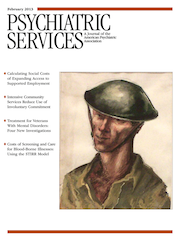Employment Status of Veterans Receiving Substance Abuse Treatment From the U.S. Department of Veterans Affairs
Abstract
Objective
This study examined employment outcomes of veterans with substance use disorders and comorbid general medical and psychiatric disorders following substance abuse treatment.
Methods
The authors obtained employment and other information reported by 5,729 veterans at intake and at follow-up three to nine months after receiving substance abuse treatment from the U.S. Department of Veterans Affairs during 2001–2010. Random-effects logistic regression models examined the probability of having employment earnings and days of paid work during the past 30 days among veterans with comorbid conditions.
Results
The percentage of veterans with any days of paid work rose from 28% at intake to 35% at follow-up. Veterans with comorbid anxiety and general medical conditions had lower odds of having earnings from employment or days of paid work at follow-up.
Conclusions
Veterans with substance use disorders, particularly those with comorbid general medical and anxiety disorders, may be at risk of employment problems.



